The government of Pakistan confirmed the execution of “intelligence-based anti-terrorist operations” within Afghanistan on Monday, outraging the Taliban, which claimed to have responded by bombing Pakistani military bases “with heavy weapons.”
The relationship between Pakistan and the Taliban-controlled Afghanistan has been tense since the terrorists seized Kabul in August 2021, the direct result of leftist American President Joe Biden’s decision to extend the already two-decade-old war in Afghanistan beyond the May 2021 deadline set by predecessor former President Donald Trump. A report published in February 2023 found that Biden left an estimated $7.2 billion in military equipment in Afghanistan, now believed to be under the control of Taliban terrorists and their allies.
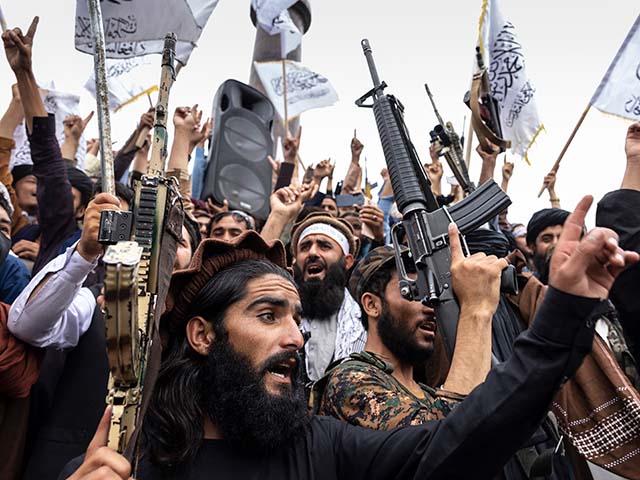
Taliban take to the streets during a national holiday celebrating the first anniversary of the Taliban takeover on August 15, 2022, in Kabul, Afghanistan. (Paula Bronstein /Getty Images)
Islamabad has blamed the Biden administration’s poorly executed extension of the war and the subsequent abrupt withdrawal of U.S. troops for a “recent resurgence in terrorism” on the Pakistani border. Evidence indicates that the weapons Biden abandoned in Afghanistan have fallen in the hands of the Tehreek-e-Taliban Pakistan (TTP), or the Pakistani Taliban, which is a separate entity from the Afghan Taliban (the “Islamic Emirate of Afghanistan”) but enjoyed an alliance with the Kabul-based terror organization.
Pakistan has increased its military operations against the TTP and other jihadist elements on the Pakistani-Afghan border, as well as launched a massive campaign to deport nearly 2 million Afghans present in the country illegally. On Monday, the Pakistani Foreign Office confirmed the execution of airstrikes on Afghan soil allegedly targeting the Hafix Gul Bahadur Group, which it claimed was affiliated with the TTP.
The statement from the Foreign Office angrily condemned the Taliban for allowing a threat to Pakistan’s national security to persist on the soil it claims to control. Pakistani officials claimed that they had successfully neutralized a TTP terrorist named Abdullah Shah, but a man claiming to be Shah published a video shortly after the attacks declaring himself alive and active in jihad.
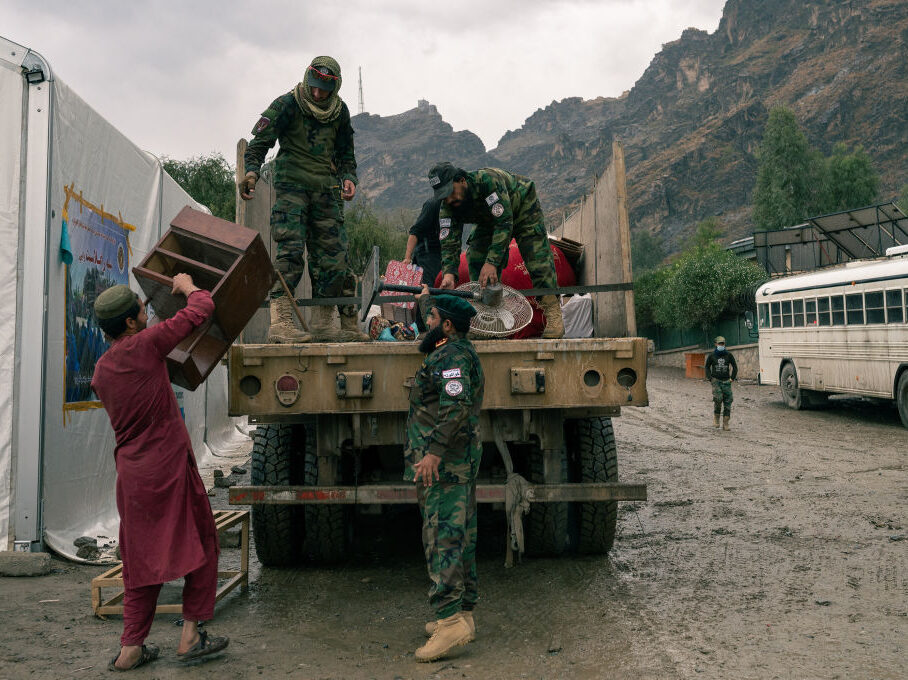
Mohammad Adnan Junudi (second from the right), 38, the Taliban military official in charge of reception operations at the Torkham border crossing in Eastern Afghanistan, helps load onto a military truck the belongings of returnees who have been deported or coerced into leaving Pakistan, on November 9, 2023. (Elise Blanchard for The Washington Post via Getty Images)
“Pakistan has repeatedly conveyed its serious concerns to the interim Afghan government [the Taliban] over the presence of terror outfits, including TTP, inside Afghanistan,” the Office statement read, according to the Pakistani newspaper Dawn. “These terrorists pose a grave threat to Pakistan’s security and have consistently used Afghan territory to launch terror attacks inside Pakistani territory.”
“Pakistan has great respect for the people of Afghanistan. However, certain elements among those in power in Afghanistan are actively patronising TTP and using them as a proxy against Pakistan,” the Foreign Office statement continued. “Such an approach against a brotherly country, which stood with the people of Afghanistan through thick and thin, manifests shortsightedness. It ignores the support extended by Pakistan to the people of Afghanistan over the last several decades.”
The Taliban’s top spokesman, Zabihullah Mujahid, confirmed that the Pakistani military had encroached into Afghan territory in a statement published to his Twitter account on Monday. Mujahid claimed that Pakistan “bombed the houses of civilians, as a result, 6 people including 3 women and 3 children were martyred and a house destroyed in Paktika, as well as, two women were martyred due to the collapse of a house in Khost province.”
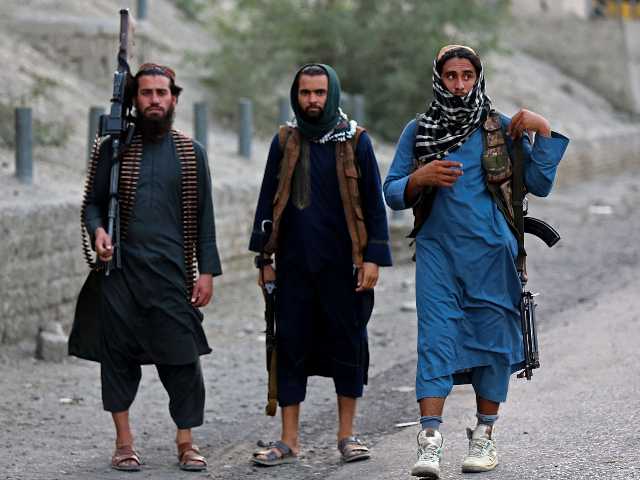
Armed Taliban security personnel pose for a photograph near the closed gates of Torkham border crossing between Afghanistan and Pakistan in Afghanistan’s eastern Nangarhar province on September 6, 2023. (SHAFIULLAH KAKAR/AFP via Getty Images)
Mujahid’s statement went on to threaten attacks on Pakistan.
“The Islamic Emirate of Afghanistan strongly condemns these attacks and calls this reckless action a violation of Afghanistan’s territory,” the spokesman declared. “The Islamic Emirate of Afghanistan, which has a long experience of freedom struggle against the superpowers of the world, does not allow anyone to invade its territory.”
“Pakistan should not blame Afghanistan for the lack of control, incompetence and problems in its own territory. Such incidents can have very bad consequences which will be out Pakistan’s control,” Mujahid added.
Mujahid also claimed that the terrorist Pakistan alleged was the target of the operations, Abdullah Shah, “is in Pakistan.”
Later on Monday, the Taliban “ministry of defense” claimed that it had bombed Pakistani military targets within Pakistan.
“In response to that aggression, the border forces of the Islamic Emirate of Afghanistan targeted military bases of Pakistan’s army across the artificial Durand Line with heavy weapons,” Taliban officials announced. Reports at press time have not offered any details on the scope of the damage from the Taliban attacks.
The Afghan broadcaster Tolo News reported on Monday that “a military confrontation between the Islamic Emirate and Pakistani soldiers started this morning (Monday) at seven and is ongoing, according to sources.”
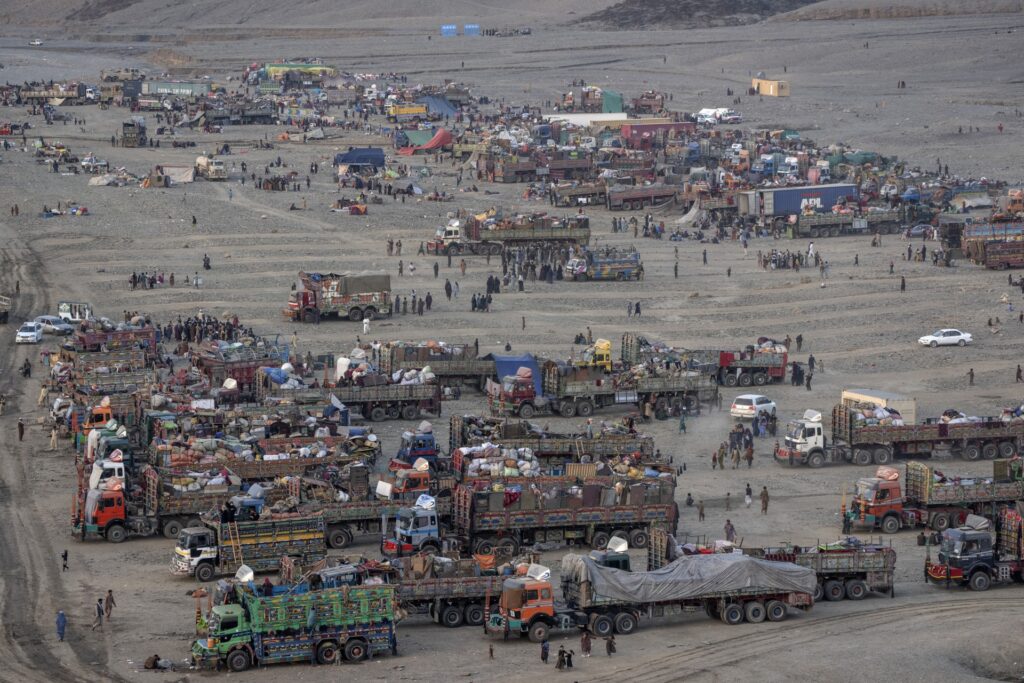
Afghan refugees settle in a camp near the Torkham Pakistan-Afghanistan border, in Torkham, Afghanistan, Friday, Nov. 3, 2023. (AP Photo/Ebrahim Noroozi)
The Pakistani military has crossed into Afghanistan on the groups of fighting terrorism in the recent past. In April 2022, Taliban leaders condemned Islamabad after sending helicopters into Afghanistan’s Khost and Kunar provinces to strike against alleged TTP targets.
“Unfortunately, elements of banned terrorist groups in the border region, including TTP, have continued to attack Pakistan’s border security posts, resulting in the martyrdom of several Pakistani troops,” the Pakistani Foreign Ministry said at the time.
Conflict between Kabul and Islamabad increased in 2023, as Pakistani officials complained that terrorists appeared to be using advanced American weaponry to engage in jihad.
“The reason for the recent resurgence of terrorism being witnessed in Khyber Pakhtunkhwa and Baluchistan [Pakistan-Afghanistan border provinces] is, unfortunately, an outcome of the rushed military withdrawal by the U.S. and NATO allies,” then-caretaker Prime Minister Anwaar-ul-Haq Kakar directly accused in September. “The rushed withdrawal has had an impact not just on Pakistan but also on Central Asia, China, Iran, and the whole region.”
The abandoned equipment, he added, “has greatly enhanced the fighting capacity of terrorists and non-state actors in the region. Previously, they had minimal capacity, but they can now target my soldier even if he moves his finger.”
Pakistan announced the mass deportation of 1.73 million Afghans in the country illegally in October, a move the Taliban angrily denounced as “unacceptable.”
“There are no two opinions that we are attacked from within Afghanistan and Afghan nationals are involved in attacks on us,” Interior Minister Sarfraz Bugti declared. “We have evidence that Afghans were involved in these attacks and are taking up the issue through our foreign ministry with Taliban authorities in Afghanistan.”
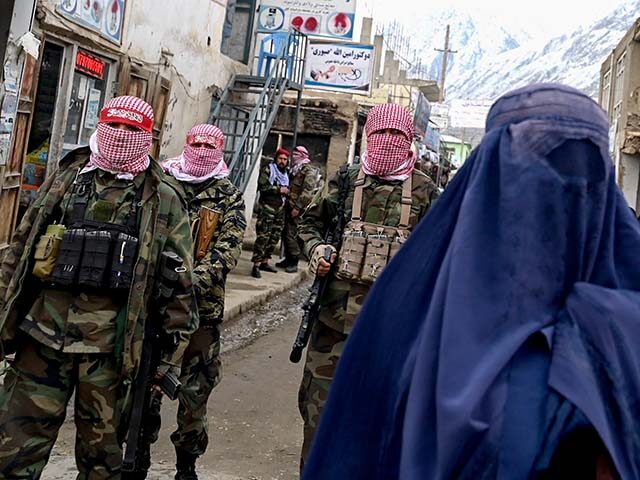
COMMENTS
Please let us know if you're having issues with commenting.